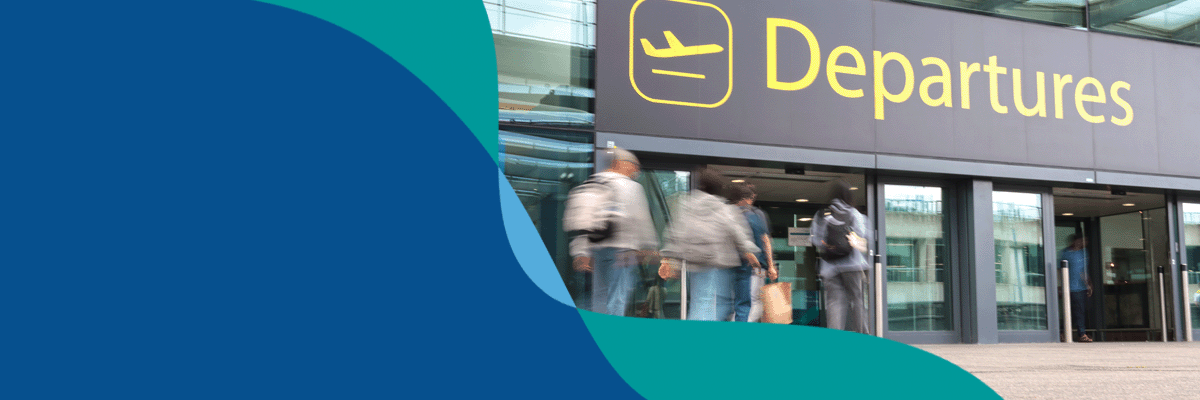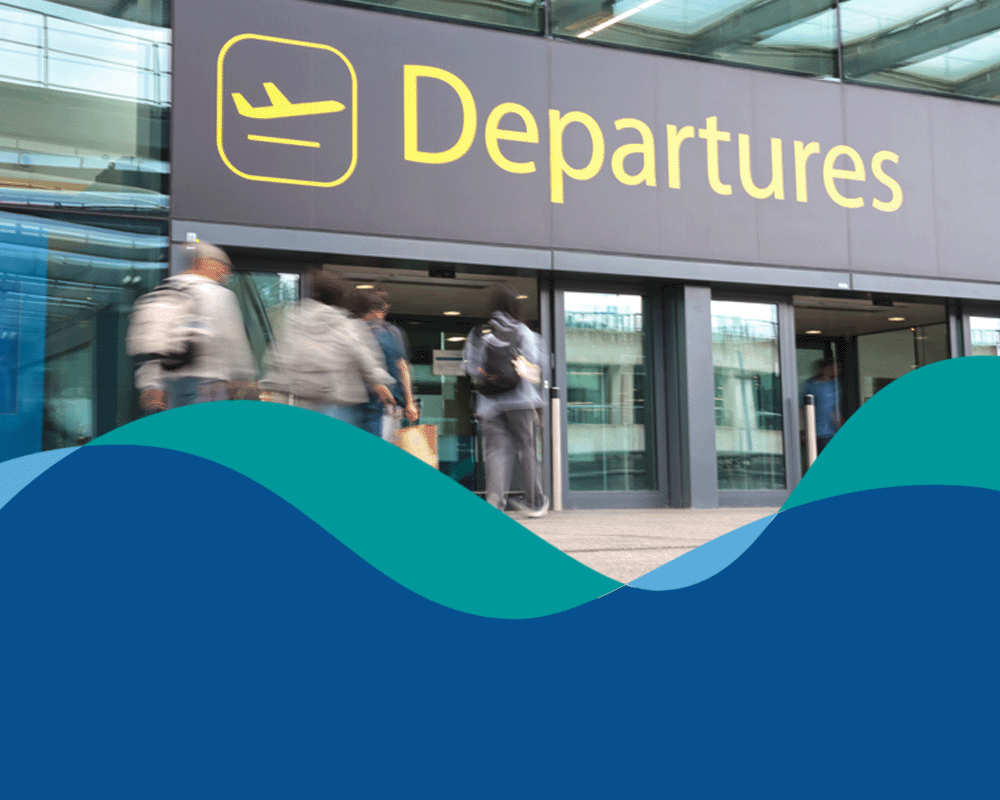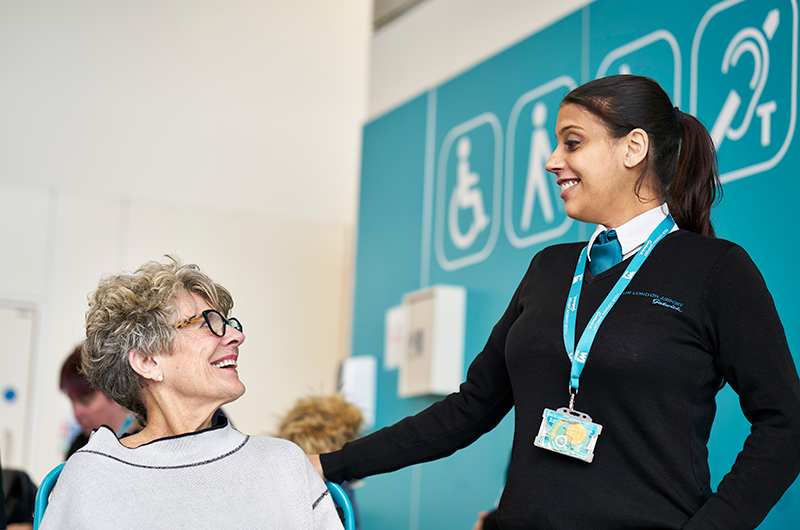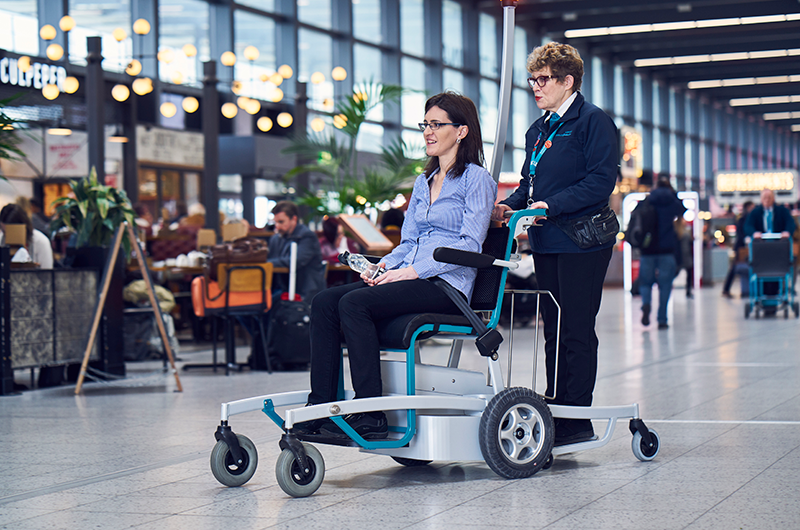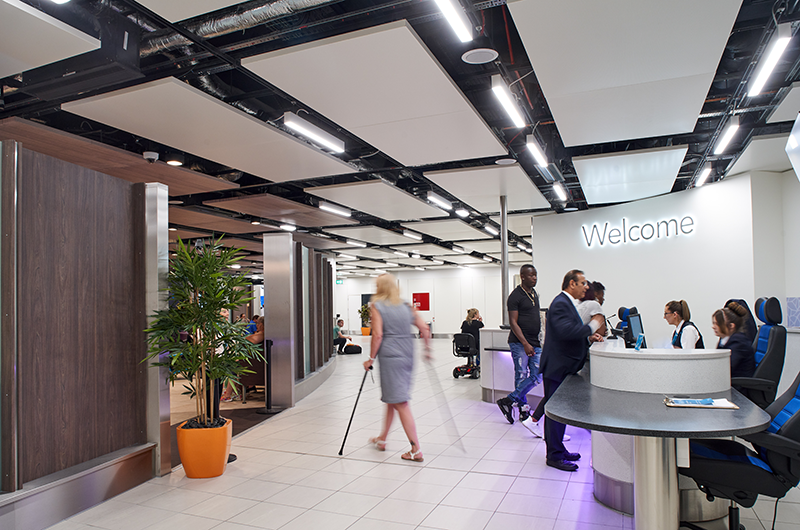Airport for everyone
London Gatwick is the airport for everyone. We aim to be the UK’s most accessible airport, prioritising the needs of every passenger and giving everyone an equal opportunity to fly.
We know airports can be challenging and stressful experiences for many people. We're passionate about creating a great experience for everyone who travels through our airport, regardless of their circumstances.
We aim to assist all passengers on their journey through London Gatwick and provide the best services for passengers needing special assistance.
You can find out more about how we work with disability groups and charities and external stakeholder groups.
The below videos are aimed at helping our passengers who may want to travel independently or semi-independently through the airport. The videos show the airport journey from arrival to the gate from the perspective of Marc Powell from the RNIB, who is partially sighted, and Sophie Bradbury-Cox who uses her own powered wheelchair.
Around 11% of the UK population has a hidden disability. It is thought that around 7% of people in the UK avoid air travel because of a hidden disability.
We were the first airport in the UK to introduce a hidden disability lanyard alongside OCS, our previous special assistance provider. This was designed to increase our support for passengers with autism, dementia, and other hidden disabilities.
The lanyard provides our team with a discreet signal that passengers, their families or carers may need extra help when travelling. Lanyards are voluntary and can be collected free of charge from any of our assistance desks. We estimate that over 100,000 lanyards have been requested since we launched the scheme.
Following our lead, the lanyard has been adopted by all other UK airports and large national retailers such as Tesco, Sainsburys and M&S. We continue to share knowledge and insights with other airports as the lanyard scheme grows, to help improve passenger journeys.
London Gatwick aims to be the most accessible airport in the UK. To achieve this goal, we engage with a range of disability groups and charities, including:
We want to ensure passengers living with dementia have a positive experience during all stages of their journey. We worked with the Alzheimer’s Society to roll out a London Gatwick-specific Dementia Friends awareness package. Over 2,000 colleagues have become Dementia Friends and we’ll continue to deliver this to our airport partners.
We're recognised by the National Autistic Society as a leader in innovative solutions for passengers. This is in recognition of introducing the hidden disability lanyard and our facilities such as our sensory room. We work with the charity and consult with them to make sure we're providing the right assistance. We're proud to be an Autism Friendly Airport.
Guide Dogs for the Blind: We offer valuable airport experience for trainee puppies and host familiarisation visits several times a year.
Crohn’s & Colitis UK: We developed improved toilet signage to recognise hidden disabilities like these.
West Sussex ADHD: We work with this local charity to support the needs of passengers or their family members travelling with ADHD.
Action for Deafness: Over 150 of our colleagues are trained to understand the challenges of travelling with a hearing impairment. Sessions are delivered several times a year to help our frontline team members to support passengers with a hearing impairment.
Ann Frye (Chair)
Ann is an international specialist in meeting the transport needs of disabled and older people. She advises public, commercial and professional bodies on policy solutions to meet mobility needs across all transport modes and the pedestrian environment.
She is currently:
- The UK Government's Disability and Accessibility Ambassador for Aviation
- A member of easyJet’s Special Assistance Advisory Group (ESAAG)
- An advisor to Gatwick on training and other PRM issues
- A lecturer on passenger rights in aviation at the European Law Academy (ERA)
- A Fellow of the Chartered Institute of Logistics and Transport (FCILT)
- A Fellow of the Institution of Highways and Transportation (FCIHT)
- An honorary Transport Planning Professional (TPP)
Ann has developed and delivered training to transport professionals including airports, airline cabin crew and pilots, call centre staff dealing with PRM bookings, and European National Enforcement Bodies.
Ann has worked in this field for over 30 years. In her previous roles, she:
- Headed the Mobility & Inclusion Unit in the UK Government Department for Transport. Here, she worked to deliver a major programme of research, legislation and policy to promote the mobility of disabled and older people in all public transport modes.
- Chaired the European Civil Aviation Conference (ECAC) sub-group on PRMs from 1996 to 2011 and led their work on the development of best practices (ECAC Doc 30). This gives statutory guidance on Regulation 1107/2006 on the rights of disabled air travellers.
- Was a member of the CAA Consumer Panel from 2012 to 2018.
She continues to work closely with the European Commission and the European Disability Forum on issues in aviation.
Ross Hovey
Ross has spinal muscular atrophy and has used an electric wheelchair since he was 16.
He has been an avid traveller all his life. Working full-time since graduating from university, Ross has continued to travel the world using his disposable income to visit warmer climates.
Ross travels with carers, his Permobile wheelchair, mobile hoist and other equipment. He has worked with Virgin on improving their disability knowledge following constructive feedback after a bad flight.
Ross is knowledgeable about access and disability working for the Lloyds Banking Group as their accessibility manager. He is also a co-chair of an inter-financial accessibility and disability network.
Sue Sharp
Sue was the CEO of the Royal Society for Blind Children (RSBC), a national charity supporting visually impaired children, young people and their families.
Before joining the third sector in 2006, Sue worked in the field of transport and disability both domestically and internationally for almost 20 years as a lead member of the Department for Transport’s disability policy team.
She is a member of the Government’s statutory advisory body, the Disabled Persons Transport Advisory Committee (DPTAC) and sits on a number of sub-committee’s including the Committee’s Aviation Working Group.
Sue has an MSc in Inclusive Environments from the University of Reading where the subject of her dissertation was access to air travel for disabled people.
Kamran Mallick
Kamran has worked in the voluntary sector for over 25 years and for the last 20 years running Disabled People Organisations (DPO). DPOs are organisations run by and for Disabled people. He worked for Aspire as Head of Training & I.T. and as CEO of Action on Disability. Since 2017 he has been CEO of Disability Rights UK. He has served on various boards of third sector organisations and was also a member of Transport for London’s Independent Disability Advisory Group for three years.
Kamran contracted polio as a child and is a wheelchair user. His experiences at both special and mainstream schools showed him that inclusive education for all children is essential. He is driven to ensure younger disabled people have better opportunities than he did.
At Action on Disability, Kamran transformed its youth service to mainstream settings and supporting inclusive activities. He built up a programme of supported internships for young people with learning difficulties, ensuring that they had real opportunities to work. He secured the long-term viability of the charity by negotiating a purpose-built office funded by the social housing above.
Kamran is listed in the Shaw Trusts 2018 Power 100 list of Britain’s most influential disabled people, and was in the top 10 in 2020. He was the runner-up in the Vodafone Diversity Campaigner award 2017 and winner of Celebrating Diversity award from London Borough of Hammersmith & Fulham’s in their inaugural Civic Honour awards 2017.
Board positions: Current - Lloyds Bank Foundation and Wheels for Wellbeing. Past: Inclusion London, Candoco Dance Company, Lyric Theatre Hammersmith.
Geraldine Lundy
Geraldine has worked in the aviation industry for over 25 years, enabling people with disabilities to fly as safely and comfortably as possible. During her years working for Virgin Atlantic she influenced the airline to introduce accessible in-flight entertainment and training customer facing colleagues to assist passengers with hidden disabilities.
In 2019, Geraldine became an independent consultant and has provided services and advice to airlines, airports, aviation industry bodies and people with disabilities. In 2019 she was thrilled to act as Master of Ceremonies for IATA’s Inaugural Global Accessibility Symposium. In 2020 she was honoured to accept an MBE in the Queen’s Birthday awards for her services to accessible aviation.
Geraldine is committed to working with others in the industry to improve processes, procedures, equipment and training further so that air travel becomes as pleasant and accessible for as many people as possible.
Neil Betteridge
Neil’s onset of arthritis at the age of three had a serious impact on his childhood. He has focused most of his career on representing the interests of disabled people and people with long term conditions in the UK and Europe. In 2011 he set up Neil Betteridge Associates (UK), offering service user insight and perspective into international initiatives.
For six years he served as Chair of DPTAC, the Disabled Persons Transport Advisory Committee, the official advisory body to the UK Dept for Transport, addressing access and many other disability issues in the context of aviation, rail, road transport and personal mobility.
In the same period, he was Head of Policy at RADAR, a predecessor body to Disability Rights UK.
He is currently Co-Chair of the Global Alliance for Musculoskeletal Health and Director of the European Alliance for Patient Access (EAfPA), a health policy think tank; and a member of the UK Parliamentary Pain Campaign Group.
For the last 20 years he was Executive Committee member of EULAR, the European rheumatology society, acting as EULAR's Liaison Officer for Public Affairs; and has previously twice been its Vice President, representing the European user group network.
Formerly he was CEO of Arthritis Care; Chair of the UK umbrella body for rheumatic and musculoskeletal diseases, ARMA; Strategic Adviser to the British Society for Rheumatology; Patient Adviser at the Royal College of Physicians; and has been a UK ministerial adviser on health as well as disability issues.
Daniel Cadey
For over five years, Daniel has worked with businesses to support their strategies around disability, inclusion and accessibility.
At the National Autistic Society, Daniel led the Autism Friendly Team and developed the Autism Friendly Award scheme. He has worked with Award holders ranging from government offices to high street brands, airports to sports and leisure centres, to improve the experience of autistic employees, visitors and families.
In his current role as Senior Business Partner for the Business Disability Forum, Daniel uses his expertise to help partner organisations in their journeys to become disability smart. He also supports the Business Disability Forum’s Global Taskforce with global and national disability strategy.
Sophie Grand
Sophie is a passionate advocate for supporting individuals with disabilities, particularly hidden disabilities, in accessing all services, with a special focus on aviation. Sophie has dedicated her career to making education inclusive for everyone and is now moving on to support the aviation industry in their journey to become more inclusive. Her deep understanding of the challenges faced by individuals with hidden disabilities comes not only from her professional endeavours but also from her own experience with a hidden disability.
Sophie possesses a strong educational background in supporting learners with Special Educational Needs and Disabilities (SEND) in schools and colleges. Her expertise in supporting individuals with Autism has been invaluable in shaping inclusive practices and fostering an environment where everyone can thrive.
In her capacity as a member of IGAP, Sophie aims to ensure a continuous improvement for those with disabilities, in accessing air travel. Sophie's unwavering dedication and personal experiences have made her a true champion of inclusivity. Her efforts continue to inspire others and pave the way for a more accessible and compassionate world.
Libby Herbert
Libby is chief executive at Colostomy UK, a national charity that supports people living with any type of stoma/s (ostomates). Like others with hidden conditions, ostomates find air travel and the airport experience challenging. Libby is passionate about changing this and making access to travel the same for everyone.
She is an active member on the Civil Aviation Authority’s (CAA) Access to Air Travel Advisory Group. She has also been working directly with eight other UK airports since 2017, in an advisory capacity. This involves guiding decision makers, helping them to make practical changes to airport infrastructure and processes, as well as ensuring that in-house training equips customer-facing employees with the tools to deal compassionately and empathically with the needs of travellers with disabilities and hidden condition.
Robert Morgan
Robert Morgan is the BSL Services Manager at Remark!, a Deaf led organisation that provides various services to the Deaf community and promotes Deaf culture and awareness. He oversees the British Sign Language training and Deaf awareness sessions, as well as developing strategies to improve accessibility and inclusion for Deaf people in the UK. Robert has a strong interest in bridging the gap between the Deaf community and the wider society.
Robert has experience with the aviation industry and improving customer relationships. As a Deaf person this was an enlightening experience as he experienced first-hand what d/Deaf customers would go through as travellers and understands the challenges and barriers they face in aviation industry. He is committed to ensure accessibility in all spheres of life.
Charlotte McMillan
Charlotte McMillan is visually impaired and sits on the panel to give advice on the experiences of visually impaired people with air travel.
